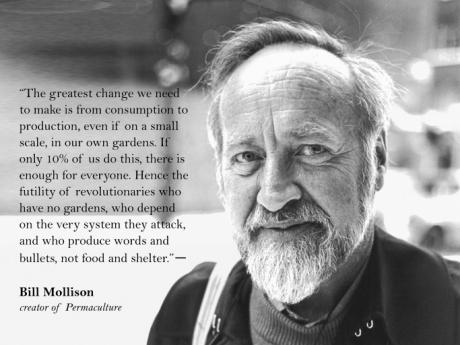The Northern School of Permaculture
You are here
Bill Mollison and Right Livelihood
In 1981, Bill Mollison received the Right Livelihood Award for his work in establishing permaculture. This page carries a copy of his acceptance speech. It explains his motivations, how he began to spread the original concepts of permaculture and his determination to find solutions amid ecological collapse.

As a child I lived in a sort of a dream and I didn't really awake until I was about 28. I spent most of my working life in the bush or on the sea. I fished, I hunted for my living. It wasn't until the 1950s that large parts of the system in which I lived were disappearing. First, fish stocks became extinct. Then I noticed the seaweed around the shorelines had gone. Large patches of forest began to die. I hadn't realised until those things were gone that I'd become very fond of them, that I was in love with my country. This is about the last place I want to be; I would like to be sitting in the bush watching wallabies. However, if I don't stand here there will be no bush and no wallabies to watch. The Japanese have come to take away most of our forest. They are using it for newsprint. I notice that you are putting it in your waste‑paper basket. That's what has happened to the life systems I grew up in.
It's always a mark of danger to me when large biological systems start to collapse, when we lose whole stocks of fish, as we've lost whole stocks of herring, and many stocks of sardines, when we lose huge areas of the sea bottom which were productive in scallops and oysters. When we enquire why this happens, it comes back to one thing: the use of energy sources not derived from the biological system.
Dr. Sternglass, who was a pupil of Einstein's, has followed the drift of radioactive dust from Three Mile Island. The newspapers say: 'Nobody died at Three Mile Island'. Dr. Sternglass says that 30,000 children are now dead, died under the cloud drifts of hypothyroidosis, and many thousands are yet to die. Across this country, Russia, Germany, Japan, Canada and the United States, drifts an air system, carrying not only radioactives, but highly corrosive acids: sulphuric acids from the burning of coal, and nitric acids from motor vehicle exhausts.
The snow which we measured in Vermont a few months back had pH values of 1.9 to 2.5, which is much more acid than vinegar, more acid than any biological system can stand. We cannot find in the northern part of the United States or in Germany waters of pH higher than 4. Fish can't breed in those waters, frogs can't live there, and salamanders are extinct. Forests started to die in 1920, soon after the coal era started. Chestnuts have disappeared on the American continent by 80%, the Beech trees have disappeared. The Oaks are beginning to die throughout America, the pines are dying in Germany (they're losing 80,000 hectares this year) and many of them are now dying in Japan. The Eucalyptus are dying in Australia at 14% per annum. It won't be very long before you won't have any forests to throw away in your garbage cans. It's obvious to simple people like myself who go out on foot to find out what's happening that the Northern hemisphere will not be occupied by man for very many more years while he uses coal, petrol and radio-actives. I wonder what happened to make us abandon the sort of life that I grew up in, in which we could sustain our lives indefinitely and in which no great systems died. I don't believe that we lead a better life, that we are any happier than I was and the children in that town still are.
I withdrew from society about 1970 because I had been long in opposition to the systems that I saw were killing us. I decided it was no good persisting with opposition that got you nowhere. I thought for two years. I wanted to return to society but I wanted to come back only with something very positive. I did not want to oppose anything again and waste my time. Somewhere someone had given me Mao‑Tse‑Tung's little red book. I didn't understand it very well, in fact it was very difficult for me to read. But, at one point when he was talking about an attack on the city of Tai Ching, his advice to his army was 'Don't attack Tai Ching: it's too heavily defended. Go around it and Tai Ching will fall.' So I've been going around the things that I think are killing us.
When I came back into our society I came back with a system I call Permaculture, a way in which man can live on the earth. To me we're not any more important a form of life than any other life form. Those of you, very few, who have been alone in forests for a long time, more than five weeks, know that you totally lose identity as a human being. You can't distinguish yourself from the trees, you can't distinguish yourself from any other living thing there. All aboriginal people, all tribal people, have to undergo such a period on their own in the environment. Afterwards, they never again can see themselves as separate: man here and tree there. You become as though you are simply a part of life.
The only safe energy systems are those derived from biological systems. A New Guinea gardener can walk through the gates of his garden taking one unit of energy and hand out seventy. A modern farmer who drives a tractor through the gate of his farm takes a thousand units of energy in and gives one back. Who is the most sophisticated agriculturist? We are getting rid of our soil even faster than we are destroying our atmosphere. For every one of us there is a loss of ten tons of soil a year. Nature can only replace one or two tons. We will leave our children an earth in which there is no soil or drinkable water.
We ourselves have always been left out of the energy equations. I'm the only machine I know which can fuel itself: I can make the food upon which I run. Give me a few friends and I can look after myself and many others. This will do me for an alternative energy source. We've never been taught to have confidence in ourselves as our own salvation. All the books you can buy on gardening are books on technique. All the books on strategy are wrong because they are one-dimensional. Multi‑dimensional systems will out‑yield one‑dimensional systems hundreds of times. Polycultures will always out‑yield monocultures. The Permaculture system is a safe way of a sustained ecology; it is in itself a safe and sustainable energy system.
In the days of Carl Linnaeus we were still naming things. For a century or so after Linnaeus we were finding out how they functioned. Today we know some of the principles that make them work but just as we've reached this stage, they have commenced to fall apart. We estimate that of the species that we can see and count, we will lose some 35,000 in the next one and a half decades. All my life we've been at war against nature. I just pray that we lose that war. There are no winners in that war.
A couple of years ago I resigned from a job at the university and threw myself at an advanced age into an uncertain future. I decided to do nothing else but to try to persuade people to build good biological systems. I existed for quite a while by catching fish and pulling potatoes. Then I started to make some money by designing sustainable systems for people, for their own houses and for their villages. Since then I've been able to train 20 people at a time. I have trained 400 young people who are now designing systems throughout the U.S. and Australia. In the coming year I will be training people in Germany and Brazil. We've set up a sort of brotherhood ‑ and sisterhood, because half of us are women. I don't believe women are any better designers than men but I think they know more about living systems.
We must make a very large movement towards a very quiet sort of revolution. We will go on training people until we have saturated all countries. What we try to do is to integrate all things that plants and animals will do with our own lives and our structures. It's possible to design entirely biological systems in which you could live, but we have to start with a place like Stockholm, which is about as abiological as you can get. There are simple things that anybody can do to look after themselves. Every city, for example, can produce its own food.
We are faced with an absolute choice: We can build the sort of cities we are building, continue to accumulate resources and power to run around like blowflies in cars, and be killed before long. Or we can live easily on the earth. It's possible for us to construct biological systems that work, it's well within our capacity. For a fraction of the cost of Swedish armaments Sweden could become an entire system like this. It's up to you, it's entirely up to you. I hope you all go back to work tomorrow and take your wages. Good luck to you.
The Right Livelihood Award, also known as the alternative Nobel Prize, is an international award to "honour and support those offering practical and exemplary answers to the most urgent challenges facing us today." The prize was established in 1980 by German-Swedish philanthropist Jakob von Uexkull, and an international jury, invited by the five regular Right Livelihood Award board members, decides the awards in such fields as environmental protection, human rights, sustainable development, health, education, and peace.
Theme by Danetsoft and Danang Probo Sayekti inspired by Maksimer
